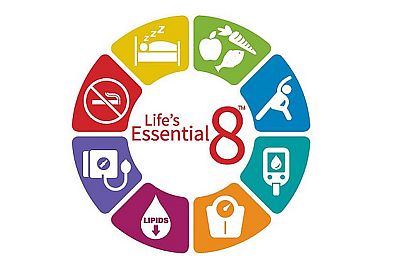The American Heart Association (AHA) has long recognized that health is a broader, more positive proposition than merely the absence of disease.
One of the AHA’s goals is shifting people’s perspective and behavior—from a focus solely on disease treatment to a more holistic approach that helps all of us understand how to avoid heart disease while also enabling positive heart health and a longer and healthier life.
 Their latest research has introduced people to a new guiding resource called Life’s Essential 8 which provides eight key measures that can lead to a lifetime of good health.
Their latest research has introduced people to a new guiding resource called Life’s Essential 8 which provides eight key measures that can lead to a lifetime of good health.
“We previously outlined the simple steps to better cardiovascular health and have now updated the guidance to encompass more than a decade’s worth of scientific research and data,” said Chris Calitz, the American Heart Association’s national executive lead for health and well-being programs. “Life’s Essential 8 provides in one place the key measures people can follow to maintain and improve heart and overall health.”
Life’s Essential 8 includes the eight most important components of heart health: a healthy diet, participation in physical activity, avoidance of nicotine, healthy sleep, healthy weight, and healthy levels of blood cholesterol, blood glucose, and blood pressure.
What’s New?
 In 2022, the AHA added three new important elements to the mix.
In 2022, the AHA added three new important elements to the mix.
The first big change is the addition of sleep as a key component of heart health. Most of us know sleep is important but adding sleep to Life’s Essential 8 based on medical research emphasizes just how important it is.
It turns out adequate sleep supports healing, improves brain function, and reduces the risk for chronic diseases. The AHA recommends most adults get 7 to 9 hours of sleep each night. Children need even more.
Next, Life’s Essential 8 now includes cautions about vaping/e-cigarettes and secondhand smoke in addition to traditional cigarette smoking. The leading cause of preventable death in the U.S., including about a third of all deaths from heart disease, is smoking.
Last, while eating better and being more active have long been on the AHA’s health checklist, a new How to Eat Better Fact Sheet was created this year to help people improve their diet quality.
Life’s Essential 8
 Eat Better: Aim for an overall healthy eating pattern that includes whole foods, lots of fruits and vegetables, lean protein, nuts, seeds, and cooking in non-tropical oils such as olive and canola. Learn How to Eat Better.
Eat Better: Aim for an overall healthy eating pattern that includes whole foods, lots of fruits and vegetables, lean protein, nuts, seeds, and cooking in non-tropical oils such as olive and canola. Learn How to Eat Better.- Be More Active: Adults should get 2 1/2 hours of moderate or 75 minutes of vigorous physical activity per week. Kids should have 60 minutes every day, including play and structured activities. Learn How to Be More Active.
- Quit Tobacco: Inhaling nicotine delivery products, including traditional cigarettes, e-cigarettes and vaping, is the leading cause of preventable death in the U.S. About a third of U.S. children are exposed to secondhand smoke or vaping. Learn How to Stop Smoking.
- Get Healthy Sleep: Most adults need 7 to 9 hours of sleep each night. Children require more: 10-16 hours for ages 5 and younger, including naps; 9-12 hours for ages 6-12; and 8-10 hours for ages 13-18. Learn How to Sleep Better.
- Manage Weight: Achieving and maintaining a healthy weight has many health benefits. Learn How to Lose or Manage Weight.
- Control Cholesterol: High levels of non-HDL, or “bad,” cholesterol can lead to heart disease. Learn Ways to Control Cholesterol.
- Manage Blood Sugar: Most of the food we eat turns into glucose (or blood sugar) that our bodies use as energy. Over time, high levels of blood sugar can damage your heart, kidneys, eyes, and nerves. Learn How to Control Blood Sugar.
- Manage Blood Pressure: Keeping your blood pressure within acceptable ranges can keep you healthier longer. Levels less than 120/80 mm Hg are optimal. Learn Ways to Manage Blood Pressure.
My Life Check
 The AHA incorporated Life’s Essential 8 into one online tool—called My Life Check—to help you assess your own heart health and to better understand your personal risk for heart disease and stroke.
The AHA incorporated Life’s Essential 8 into one online tool—called My Life Check—to help you assess your own heart health and to better understand your personal risk for heart disease and stroke.
It’s free, confidential, and available to everyone. If you have your numbers handy from a recent physical, that’s great. If not, My Life Check can get started with the information you do have.
The result? You can learn where you stand against the 8 heart health checkpoints and, more importantly, what to do next. It only takes around 10 minutes.
Of course, My Life Check shouldn’t take the place of your healthcare provider. Your doctor should always be the place you turn to for your health assessments and care.
But My Life Check can be one more way for you to get a feel for how you’re doing, and to help understand some of the areas where you can make improvements that will benefit your health and wellbeing.
Never Too Late to Start
The American Heart Association stresses that it is never too late to realize benefits from improvement in cardiovascular health.
However, the earlier you work to optimize your heart health, the better your outcomes will be. No matter your age or your starting point, following the guidelines set forth in Life’s Essential 8, and following your doctor’s advice, can help lower your risk for heart disease, help you on the road to better cardiovascular health, and help you achieve your long-term health goals and potential.
Since 2015, as part of our Healthy for Life Initiative, Aramark has been proud to work with the American Heart Association to help improve the health of all Americans through our healthy menu, consumer, employee, and community health initiatives.
Note: Since everyone’s health history and nutritional needs are so different, please make sure that you talk with your doctor and a registered dietitian to get advice about the diet and exercise plan that‘s right for you.

